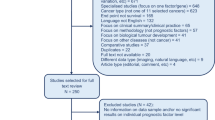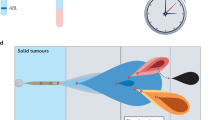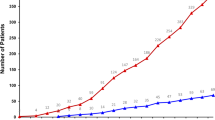Abstract
Many experts agree that personalized cancer medicine, defined here as treatment based on the molecular characteristics of a tumor from an individual patient, has great potential in the therapy of many types of cancer. Although targeted therapy agents are increasingly available for clinical applications, many of these promising drugs have produced disappointing results when tested in clinical trials, indicating that there are many challenges that must be addressed to advance this field. We propose that a new generation of clinical trials requiring biopsies to obtain relevant tumor specimens, as well as novel statistical designs, will be essential to improve treatment outcomes. However, these novel clinical trials will only be successful if appropriate biomarkers are identified to help guide the selection of the most beneficial treatments for the participating patients. Although biomarkers based on single gene mutations are the most commonly used in clinical applications today, gene-expression or protein-expression 'signatures' and new imaging technologies have the potential to play important roles as biomarkers in the future. Therefore, it is of crucial importance that we identify and resolve existing challenges that may impede the rapid identification and translation of validated biomarkers with acceptable sensitivity and specificity from the laboratory to the clinic. These challenges include limitations of current biomarker development methodologies and regulatory and reimbursement policies and practices.
Key Points
-
Many promising targeted therapy agents have had disappointing results when tested in clinical trials
-
Validated biomarkers with acceptable sensitivity and specificity are urgently needed to help guide the selection of the most beneficial treatments for patients with cancer
-
A new generation of clinical trials requiring biopsies to obtain relevant tumor specimens, as well as novel statistical designs, will be essential to improve treatment outcomes
-
Molecular imaging of novel biomarkers or targets can add valuable spatial dimension and temporal data that could substantially improve assessments of targeted treatment efficacy
-
Current challenges include the limitations of current biomarker and imaging agent development methodologies, particularly for the molecular analysis of small tissue specimens, and regulatory and reimbursement policies
This is a preview of subscription content, access via your institution
Access options
Subscribe to this journal
Receive 12 print issues and online access
$209.00 per year
only $17.42 per issue
Buy this article
- Purchase on Springer Link
- Instant access to full article PDF
Prices may be subject to local taxes which are calculated during checkout


Similar content being viewed by others
References
O'Leary, M., Krailo, M., Anderson, J. R. & Reaman, G. H. Progress in childhood cancer: 50 years of research collaboration, a report from the Children's Oncology Group. Semin. Oncol. 35, 484–493 (2008).
National Cancer Institute. SEER Cancer Statistics Review 1975–2004 [online], http://seer.cancer.gov/csr/1975_2004/ (2007).
Collins, I. & Workman, P. New approaches to molecular cancer therapeutics. Nat. Chem. Biol. 2, 689–700 (2006).
Kaye, F. J. Mutation-associated fusion cancer genes in solid tumors. Mol. Cancer Ther. 8, 1399–1408 (2009).
Torkamani, A., Verkhivker, G. & Schork, N. J. Cancer driver mutations in protein kinase genes. Cancer Lett. 281, 117–127 (2009).
Vogelstein, B. & Kinzler, K. W. Cancer genes and the pathways they control. Nat. Med. 10, 789–799 (2004).
William, W. N. Jr, Heymach, J. V., Kim, E. S. & Lippman, S. M. Molecular targets for cancer chemoprevention. Nat. Rev. Drug Discov. 8, 213–225 (2009).
Ferté, C., André, F. & Soria, J. C. Molecular circuits of solid tumors: prognostic and predictive tools for bedside use. Nat. Rev. Clin. Oncol. 7, 367–380 (2010).
Harris, T. J. & McCormick, F. The molecular pathology of cancer. Nat. Rev. Clin. Oncol. 7, 251–265 (2010).
Lynch, T. J. et al. Activating mutations in the epidermal growth factor receptor underlying responsiveness of non-small-cell lung cancer to gefitinib. N. Engl. J. Med. 350, 2129–2139 (2004).
Paez, J. G. et al. EGFR mutations in lung cancer: correlation with clinical response to gefitinib therapy. Science 304, 1497–1500 (2004).
Fidler, I. J. Tumor heterogeneity and the biology of cancer invasion and metastasis. Cancer Res. 38, 2651–2660 (1978).
Heppner, G. H. Tumor heterogeneity. Cancer Res. 44, 2259–2265 (1984).
Alymani, N. A., Smith, M. D., Williams, D. J. & Petty, R. D. Predictive biomarkers for personalised anti-cancer drug use: discovery to clinical implementation. Eur. J. Cancer 46, 869–879 (2010).
Kulasingam, V. & Diamandis, E. P. Strategies for discovering novel cancer biomarkers through utilization of emerging technologies. Nat. Clin. Pract. Oncol. 5, 588–599 (2008).
van 't Veer, L. J. et al. Gene expression profiling predicts clinical outcome of breast cancer. Nature 415, 530–536 (2002).
Paik, S. et al. A multigene assay to predict recurrence of tamoxifen-treated, node-negative breast cancer. N. Engl. J. Med. 351, 2817–2826 (2004).
Kwak, E. L. et al. Anaplastic lymphoma kinase inhibition in non-small-cell lung cancer. N. Engl. J. Med. 363, 1693–1703 (2010).
O'Brien, S. G. et al. Imatinib compared with interferon and low-dose cytarabine for newly diagnosed chronic-phase chronic myeloid leukemia. N. Engl. J. Med. 348, 994–1004 (2003).
Demetri, G. D. et al. Efficacy and safety of imatinib mesylate in advanced gastrointestinal stromal tumors. N. Engl. J. Med. 347, 472–480 (2002).
Pomper, M. G. & Gelovani, J. G. (Eds) Molecular Imaging in Oncology (Informa Healthcare, New York, 2008).
Eisenhauer, E. A. et al. New response evaluation criteria in solid tumours: revised RECIST guideline (version 1.1). Eur. J. Cancer 45, 228–247 (2009).
Mishani, E. & Hagooly, A. Strategies for molecular imaging of epidermal growth factor receptor tyrosine kinase in cancer. J. Nucl. Med. 50, 1199–1202 (2009).
Pal, A. et al. Radiosynthesis and initial in vitro evaluation of [18F]F-PEG (6)-IPQA—a novel PET radiotracer for imaging EGFR expression-activity in lung carcinomas. Mol. Imaging Biol. doi:10.1007/s11307-010-0408–8.
Tomura, N. et al. Comparison of 201Tl-chloride SPECT with 99mtc-MIBI SPECT in the depiction of malignant head and neck tumors. Ann. Nucl. Med. 20, 107–114 (2006).
Schoenberger, J. et al. Clinical value of planar and tomographic dual-isotope scintigraphy using 99mTc-methylene diphosphonate and 131I in patients with thyroid cancer. Nucl. Med. Commun. 27, 865–871 (2006).
Glunde, K., Artemov, D., Penet, M. F., Jacobs, M. A. & Bhujwalla, Z. M. Magnetic resonance spectroscopy in metabolic and molecular imaging and diagnosis of cancer. Chem. Rev. 110, 3043–3059 (2010).
Pinker, K., Stadlbauer, A., Bogner, W., Gruber, S. & Helbich, T. H. Molecular imaging of cancer: MR spectroscopy and beyond. Eur. J. Radiol. doi:10.1016/j.ejrad.2010.04.028.
Kobayashi, H. & Choyke, P. L. Target-cancer-cell-specific activatable fluorescence imaging probes: rational design and in vivo applications. Acc. Chem. Res. doi:10.1021/ar1000633.
Institute of Medicine. Policy Issues in the Development of Personalized Medicine in Oncology: Workshop Summary (The National Academies Press, Washington DC, 2010).
Gutierrez, M. E., Kummar, S. & Giaccone, G. Next generation oncology drug development: opportunities and challenges. Nat. Rev. Clin. Oncol. 6, 259–265 (2009).
Zhou, X., Liu, S., Kim, E. S., Herbst, R. S. & Lee, J. J. Bayesian adaptive design for targeted therapy development in lung cancer--a step toward personalized medicine. Clin. Trials 5, 181–193 (2008).
Kim, E. S. et al. The BATTLE trial (Biomarker-integrated Approaches of Targeted Therapy for Lung Cancer Elimination): Personalizing therapy for lung cancer. Presentation at the American Association for Cancer Research, Washington, D.C., April 18 2010.
Kim, E. S. et al. The BATTLE Trial: Personalizing Therapy for Lung Cancer. Cancer Discovery (in press).
US Department of Health and Human Services. Clinical Laboratory Improvement Amendments (CLIA) [online], http://www.cms.gov/clia/ (2010).
Pendergast, M. K. Regulatory agency consideration of pharmacogenomics. Exp. Biol. Med. (Maywood) 233, 1498–1503 (2008).
Hoffman, J. M., Gambhir, S. S. & Kelloff, G. J. Regulatory and reimbursement challenges for molecular imaging. Radiology 245, 645–660 (2007).
Harapanhali, R. S. Food and Drug Administration requirements for testing and approval of new radiopharmaceuticals. Semin. Nucl. Med. 40, 364–384 (2010).
Acknowledgements
This work was supported in part by the Department of Defense Grant W81XWH-6-1-0303 and the NIH/NCI Cancer Center Support Grant P30 CA016672. The content is solely the responsibility of the authors and does not necessarily represent the official views of the NCI or NIH.
Author information
Authors and Affiliations
Contributions
I. I. Wistuba, J. G. Gelovani, J. J. Jacoby and R. S. Herbst researched data to include in the manuscript. All the authors contributed to discussion of content for the article, reviewed and edited the manuscript before submission, and revised the manuscript in response to the peer-reviewers' comments.
Corresponding author
Ethics declarations
Competing interests
J. G. Gelovani declares he is a consultant for Macrocyclics Inc. and SibTech. He also receives grant/research support from General Electric, the NIH and the M. D. Anderson Cancer Center, and is a holder of a patent application from the M. D. Anderson Cancer Center. The other authors declare no competing interests.
Rights and permissions
About this article
Cite this article
Wistuba, I., Gelovani, J., Jacoby, J. et al. Methodological and practical challenges for personalized cancer therapies. Nat Rev Clin Oncol 8, 135–141 (2011). https://doi.org/10.1038/nrclinonc.2011.2
Published:
Issue Date:
DOI: https://doi.org/10.1038/nrclinonc.2011.2
This article is cited by
-
Minimally Invasive Injectable Thermochemical Ablation Therapy of Malignant Tumor via Alkali Metal Fluid
Biomedical Materials & Devices (2023)
-
Metformin inhibits human non-small cell lung cancer by regulating AMPK–CEBPB–PDL1 signaling pathway
Cancer Immunology, Immunotherapy (2022)
-
Time dependent effect of cold ischemia on the phosphoproteome and protein kinase activity in fresh-frozen colorectal cancer tissue obtained from patients
Clinical Proteomics (2021)
-
Efficacy and safety of recombinant human endostatin combined with radiotherapy or chemoradiotherapy in patients with locally advanced non-small cell lung cancer: a pooled analysis
Radiation Oncology (2020)
-
Assessment of metabolic patterns and new antitumoral treatment in osteosarcoma xenograft models by [18F]FDG and sodium [18F]fluoride PET
BMC Cancer (2018)



